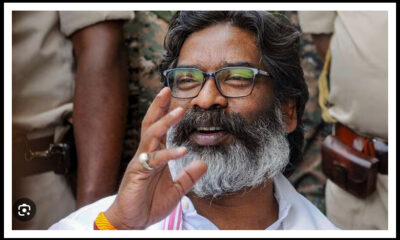Aam Aadmi Party
Delhi Services Act becomes a law following approval from President Droupadi Murmu
Published
9 months agoon

At least two of these Bills that have since become law encountered fierce opposition from the opposing parties
President Droupadi Murmu of New Delhi today granted his approval to four bills that were voted during the turbulent monsoon session of the legislature. Now that they have been signed into law, the Digital Personal Data Protection Bill, the Registration of Births and Deaths (Amendment) Bill, the Jan Vishwas (Amendment of Provisions) Bill, and the Government of National Capital Territory of Delhi (Amendment) Bill.
Two of these Bills, which have just been made law, encountered fierce opposition from the opposing parties.
The INDIA group has voiced strong opposition to the Centre’s bill on control of services in the city, which replaces an order that took authority over Delhi’s bureaucracy away from the Aam Aadmi Party-led administration. When the issue was brought up in the parliament, the members of the opposition alliance had left.
The government’s planned rule, which defies a Supreme Court ruling on who governs bureaucrats in the national capital, has been supported by Home Minister Amit Shah. The Supreme Court had decided that the elected government is in charge of Delhi following an eight-year conflict between the Center and the Arvind Kejriwal administration.
Read also:-DAV’S ENVIRONMENTAL AWARENESS PROGRAMME
“This ordinance makes reference to the Supreme Court’s ruling that the legislature has the authority to pass legislation on any matter pertaining to Delhi’s National Capital Territory. The center is permitted by the Constitution to enact legislation for Delhi, according to Mr. Shah.
Arvind Kejriwal, the chief minister of Delhi, claimed that the bill solely aimed to “enslave” the residents of Delhi before it was enacted.
After a vote in which 102 lawmakers opposed the legislation and 131 supported it, the Bill was passed.
In the midst of protests from opposition members on the Manipur problem, the Digital Personal Data Protection (DPDP) Bill was approved by voice vote. By voice vote, the Opposition’s proposed modifications were rejected in part.
The bill includes a clause that allows for fines of up to 250 crore for data breaches in an effort to prevent online platforms from abusing users’ personal information.
The measure, according to the opposition, will transform the nation into a surveillance state. Opponents worried that enabling the processing of personal data without agreement in nine broad situations could have negative effects on citizens’ fundamental right to privacy.
Concerns have also been raised about exemptions to the state and a disputed phrase that grants some firms extensive exclusions. The Personal Data Protection Bill was earlier submitted by the center in 2019, but it was withdrawn last year after being examined by a legislative committee.
You may like
-


Speaking candidly about Sanjay Kapoor’s extramarital affair, Maheep Kapoor expresses his desire for Shanaya to not experience the same fate.
-


Preity Zinta’s Trending Remark on Manisha Koirala’s Post About Dil Se: “A Hero On And Off Camera”
-


Rabindra Jayanti Celebration at DAV, Jaipur
-


Kohli brings out alternative arsenal to counter spin bowling ahead
-


The Supreme Court rules that former Jharkhand Chief Minister Hemant Soren’s plea in a money laundering case was “infructuous.”
-


Janhvi Kapoor Wears A Red Cutout Dress Inspired By A Cricket Ball, Similar To Zendaya’s Movie-Themed Outfits

